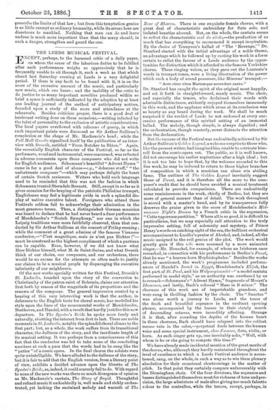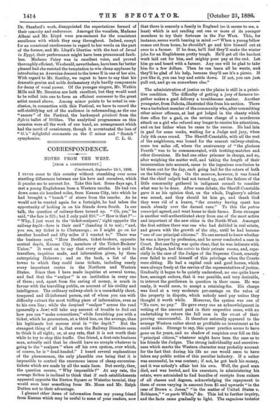THE LEEDS MUSICAL FESTIVAL.
EXCEPT, perhaps, to the harassed critic of a daily paper, on whom the sense of the laborious duties to be fulfilled after each performance weighs so oppressively that he is frequently unable to sit through it, such a week as that which closed last Saturday evening at Leeds is a very delightful period. If there is any fault to be found with it, it is on the score of the excessive amount of the music, and particularly new music, which one hears ; and the inability of the critic to do justice to so many important novelties produced within so brief a space is sufficiently indicated by the adoption by at least one leading journal of the method of anticipatory notices, founded upon a study of the score and attendance at the rehearsals. Besides criticism proper, there is a good deal of irrelevant writing done on these occasions,—writing infected by the taint of personality to the exclusion of artistic considerations. The local papers overflowed with columns of gossip, in which such important points were discussed as Sir Arthur Sullivan's complexion or the shape of Mr. Mackenzie's head ; while the Pall Mall Gazette signalised itself by the publication of an inter- view with Dvorak, entitled "From Butcher to Baton." Again, the essentially English character of the Festival, so far as the performers, vocal and instrumental, were concerned, was reflected in adverse comments upon those composers who did not write for English audiences. Schumann's beautiful " Advent Hymn " came in for a good deal of abuse—e.g., "dolorous stuff," "the unfortunate composer "—which may perhaps delight the heart of certain Scotch reviewers. Writers who hold such language need to be reminded that this was not the fashion in which Schumann treated Sterndale Bennett. Still, except in so far as it gives occasion for the braying of the patriotic Philistine trumpet, Englishmen may feel a legitimate pride in such a splendid dis- play of native executive talent. Foreigners who attend these Festivals seldom fail to acknowledge their admiration in the most generous terms. Thus, a distinguished German musician was heard to declare that he had never heard a finer performance of Mendelssohn's "Scotch Symphony," nor one in which the Leipzig traditions were more faithfully observed, than that con- ,ducted by Sir Arthur Sullivan at the concert of Friday evening ; while the comment of a great admirer of the famous Viennese conductor,—" C'est magnifique, mais ce n'est pas Richter !"- must be construed as the highest compliment of which a partisan can be capable. Even, however, if we did not know what Herr Richter himself, what M. de Saint-Satins, and what Dvorak think of our choirs, our composers, and our orchestras, there would be no excuse for the attempts so often made to justify our claims to be a musical people by disparaging the executive inferiority of our neighbours.
Of the new works specially written for this Festival, Dvoralc's St. Ludmila, founded upon the story of the conversion to `Christianity of the patron saint of Bohemia, claims our attention first both by reason of the magnitude of its proportions and the renown of the composer. The general impression created by a hearing of this very interesting work is that the .author, in deference to the English taste for choral music, has modelled his style upon the lines of the monumental works of Mendelssohn, Beethoven, and Handel, with a result that hardly justifies this new -departure. In The Spectre's Bride he spoke more freely and naturally, rivetting the interest from first to last. There are noble moments in St. Ludmila, notably the splendid choral climax to the first part; but, as a whole, the work suffers from its transitional character, the dullness of the story, and the inordinate length of its musical setting. It was perhaps from a consciousness of this fact that the conductor was led to take some of the concluding numbers at such a pace that the words had to be sung like the "patter " of a comic opera. In the final chorus the soloists were .quite unintelligible. We have alluded to the dullness of the story, but it is fair to add that the English version, from a literary point of view, exhibits a decided advance upon the libretto of The Spectre's Bride, as, indeed, it could scarcely fail to do. With regard to none of the uew works was there to much divergence of opinion as Mr. Mackenzie's cantata, The Story of Sayid. Thoughtful and refined music it undoubtedly is, well made and richly orches- trated, yet lacking the sustained melody and warmth of The Bose of Sharon. There is one exquisite female chorus, with a great deal of characteristic embroidery for flute solo, and isolated beauties abound. Bat, on the whole, the cantata seems to reflect the characteristic mel du siecle,—the production of so much that has everything to recommend it except inspiration. By the choice of Tennyson's ballad of " The ' Revenge,' " Dr. Stanford started with the initial advantage of a noble theme, an advantage which he followed up by casting his work in a form certain to enlist the favour of a Leeds audience by the oppor- tunities for distinction which it afforded to the famous Yorkshire chorus. These ringing voices, as they gave out the Laureate's words in trumpet-tones, were a living illustration of the power which such a body of sound possesses, like Misenus' trumpet:— " Aere &ere viros Martemque acoendere canto."
Dr. Stanford has caught the spirit of the original most happily, and set it forth in straightforward, manly music. The choir, and especially the tenors, who declaimed their words with admirable distinctness, evidently enjoyed themselves immensely in this work, and the applause which arose at its conclusion was as hearty as any heard during the week. We shall be much surprised if the verdict of Leeds be not endorsed at every suc- cessive performance of this spirited setting of an immortal ballad. The melody, though simple, is always dignified ; and the orchestration, though masterly, never distracts the attention from the declamation.
But the success of the Festival was undoubtedly achieved by Sir Arthur Sullivan's Golden Legend, a welcome surprise to those who, like the present writer, had imagined him unable to extricate him- self from the comic-opera rut. The public, as it is well known, did not encourage his earlier aspirations after a high ideal ; but it is not too late to hope that, by the welcome accorded to this fine work, he may be induced to return to those higher branches of composition in which a musician can alone win abiding fame. The outlines of The Golden Legend inevitably suggest those of Faust, and it is therefore all the more to the com- poser's credit that he should have avoided a musical treatment calculated to provoke comparisons. There are undoubtedly some reminiscences in the work, chiefly of Berlioz, but they are more of general manner than of detail. The work throughout is scored with a master's hand, and by its transparence fully deserves the praise given to the score of Mendelssohn's Mid- summer Night's Dream by a French critic in the expression, " Cette vaporeuse partition." Where all is so good, it is difficult to particularise, but we may especially call attention to the truly impressive setting, full of solemnity and mystery, of Prince Henry's words on catching sight of the sea, the brilliant orchestral accompaniment to Lucifer's praise of Alcohol, and, indeed, all the music assigned to the evil genius of the plot. The work would greatly gain if this role were assumed by a more animated singer,—Mr. Henschel, for example, of whom an Irishman once remarked, in connection with his performance in Berlioz's Faust, that he was " a heaven-born Mephistopheles." Besides the works already mentioned, the week's programme included perform- ances of Handel's Israel in Egypt, Mendelssohn's Elijah, the first part of St. Paul, and his Walpurgisnacht—" a model cantata performed in model style," as an authority was overheard by us to remark—Schumann's " Advent Hymn," fragments of Mozart's Idomeneo, and lastly, Bach's colossal " Mass in B minor." The choruses of this work are of imperishable grandeur, and were sung in thrilling fashion by the choir. The " Sanctus " was alone worth a journey to Leeds, and the tones of the fresh and beautiful sopranos in the exultant opening phrase, accompanied by the basses in their stately march of descending octaves, were incredibly affecting. Strange it is that, after sounding the depths of the human heart in these choruses, Bach should have relapsed into the coldest rococo vein in the solos,—perpetual duels between the human voice and some special instrument, oboe d'amore, flute, violin, or horn. As each singer gets up, one inevitably asks, " Well, with whom is he or she going to compete this time P"
We have already made incidental mention of the great merits of the chorus, who, although they hardly maintained throughout the level of excellence to which a Leeds Festival audience is accus- tomed, sang, on the whole, in such a way as to win them plenary absolution for their occasional shortcomings in the matter of pitch. In that point they certainly compare unfavourably with the Birmingham choir. Of the four divisions, the sopranos and basses distinguished themselves most for richness of tone andpre- cision, the large admixture of male altos giving too much falsetto colour to the contraltos, while the tenors, except, perhaps, in
Dr. Stanford's work, disappointed the expectations formed of their sonority and endurance. Amongst the vocalists, Madame Albani and Mr. Lloyd were pre-eminent for the consistent excellence with which they sang throughout. Indeed, except for an occasional carelessness in regard to her words on the part of the former, and Mr. Lloyd's liberties with the text of Israel in Egypt, their performance might have been pronounced fault- less. Madame Patey was in excellent voice, and proved thoroughly efficient. We should, nevertheless, have been far better pleased had she resisted the temptation to win cheap applause by introducing an Avernian descent to the lower E in one of her airs. With regard to Mr. Santley, we regret to have to say that his dramatic genius and noble declamatory style hardly compensate for decay of vocal power. Of the younger singers, Mr. Watkin Mills and Mr. Brereton are both excellent; but they would need to be rolled into one to form an efficient successor to the great artist named above. Among minor points to be noted in con- clusion, in connection with this Festival, we have to record the self-stultifying act of the audience in redemanding, as the one " encore " of the Festival, the hackneyed pizzicati from the Sylvia ballet of Delibes. The analytical programmes on this occasion were all the work of one hand, an arrangement which had the merit of consistency, though it accentuated the lose of " G.'s " delightful comments on the C minor and " Scotch"



































 Previous page
Previous page